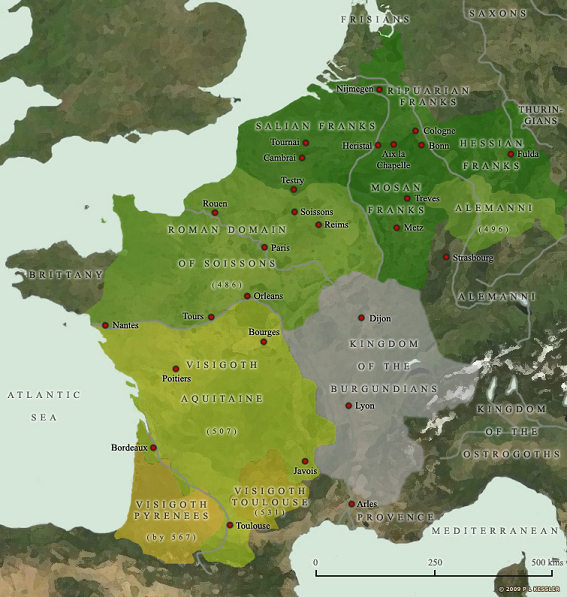|
In the year 476 AD, the foederati mercenaries that had come to comprise the majority of the Western Roman military rebelled against the newly-installed child Emperor, the unfortunately-named Romulus Augustus, after his father Orestes refused to grant them permanent land in Italy in recognition of their service. They seized the city of Rome and all of the few territories still under its direct rule and proclaimed their leader, Odoacer, rex Italiae - King of Italy. From a modern perspective, this is regarded as the definitive end of the Western Empire, and, depending on who you ask, both the original Roman civilization and the classical era itself. It's also probably a story you already know. But like everything else involving the "fall" of Rome, this is a little more fuzzy than many are aware. Because, for a decade following this, a small part of the west was still ruled by a almost direct continuation of its properly-appointed Roman government, with it's institutions and the culture of its leadership intact.  Referred to today as the Kingdom or Domain of Soissons but supposedly known by local tribes contemporarily as the "Kingdom of the Romans", the remnants of Roman Gaul were placed under the governership of the Gallo-Roman aristocrat Aegidius of the Syagrii - a powerful family from Lugdunum, the once-capital of the province, with roots that went back to the Republican era - by Emperor Majorian in 461, to whom he was a fervent loyalist. Over the course of the next several years, the province became severed from the rest of the empire as the Visigoths came to dominate southern Gaul in the wake of numerous short-reigning, weak Emperors. When Aegidius died, he was succeeded in his appointment directly by his son, Syagrius, who received only vague recognition from the capital, which was busy falling completely to pieces. (The borders of the Empire at the time.) Historical records of this pseudo-state are pretty limited - It's even commonly questioned by some historians if it meaningfully existed as anything more than a fragmenting political faction in an increasingly Frankish region after the deposition of Romulus. But in the traditional view, right up until his death, Syagrius still considered himself as acting under the authority of Rome. While he refused to swear fealty to Odoacer following his ascension to power, he repeatedly sent messengers to the Byzantines for direction, and continued to refer to himself with the title of "Dux", denoting a provincial governor. If anything, the realm is most famous for who destroyed it. After enduring a handful of assaults from the expansionist Salians in the west, Syagrius was finally defeated in the Battle of Soissons in 486 by Clovis I, who would go on to become the first King of the Franks and convert to Christianity, beginning the history of France and the Holy Roman Empire, and establishing a culture that would go on to define much of western Europe all the way up until the modern day. So, all in all, a pretty inglorious fate for a pretty unimportant rump state with a government no longer fit for the times, that was likely doomed by circumstance from the start. Or was it? Let's see if we can do a little better. Let's not goof around. You know what Paradox's grand strategy games are. If you're here, you've probably already followed one of the fifty-something other campaigns or megacampaigns of their games that have been on this subforum over the course of the past nine years. You can probably point to the de jure capitals of most medieval European polities on a map. You embarrass yourself by referring to Istanbul as "Constantinople" in real life, and have to hastily explain you're not trying to be political. Sometimes, you forget that the British Isles aren't actually ruled by some sort of pan-celtic kingdom. How is this going to go? We're going to be playing as the Kingdom of Soissons, or Roman Gaul, starting in Crusader Kings and maybe continuing on to Europa Universalis 4 and beyond if I am having a lot of fun. I want to say right now that I'm not sure how well I'll really do at this - I used to have a bit of bad history when it came to burning out on LPs pretty early, and though I've become a lot better at focusing over the past few years, I'm not sure how entertaining I'll be able to be or if this'll end up being a lot more overwhelming than I anticipate. If you're the type of person who gets really frustrated when threads like this are abandoned or succumb to conversion fatigue, maybe give this a miss. I'll do my best, though! Wait a minute, Crusader Kings earliest start date is 769! How are you going to play a realm from the migration period? I'm going to be using a mod called The Winter King that is set exclusively in western Europe over the course of the 5th to 10th centuries. It was originally based on a set of quasi-historical fiction novels by Bernard Cornwell, but was adopted by a different team and has evolved to have a larger scope. Though not hyper ambitious, it's the most professional feeling of the popular overhaul mods, in my opinion. While largely rooted in real events, it fills the gaps in this poorly-documented period of history with a few mythological characters, such as King Arthur - But I've messed with it to remove most of the excessively fantastical content, as well as replaced the explicit references to the book series with more period-appropriate lies from Geoffrey of Monmouth's Historia Regum Britanniae. Here's the provincial map. Despite being spread over a much, much smaller area geographically, there's still about two thirds as many counties as vanilla.  I chose it over When The World Stopped Making Sense, the other mod that covers the era, for a couple reasons. Firstly, I think it does a better job of capturing the "dark ages feel", where infrastructure has collapsed and the world feels much larger and more dangerous. Secondly, because I don't want to spend literally 1000 years in just one game - that's another reason I'm not sure if this is going past CK2, since it's going to be a very medieval-heavy campaign to begin with - and it does a lot more to mix up the gameplay and general feel. The battles are short and sharp, with troop movement sped up considerably due to the smaller scale, and the dynamics between powers can feel very different without being awkward or overloaded with features. The way territory control works is also set up to be less about de jure claims and more about how efficiently you can slice peoples guts out. I'll "convert" us to mainline CK2 at one of the early start dates for the regular game. Probably 867, but possibly 769 if we're pushing the edge of the Winter King map so much it becomes ridiculous. As a side benefit of the small scope, this process will be pretty painless and not slow things down in the way conversions often do. Didn't someone already do a Roman campaign? You're probably thinking of Empress Theonora's Blood in the Bosphorous campaign, which I enjoyed a lot and even made a couple cringey posts in. That was based around eastern Rome with a leaning towards the modern day, though, so hopefully this'll be distinct enough to not be boring. What made you think this was a good idea? I've got to the point where I'm pretty good at modding CK2, and wanted to put that skill to some entertaining use beyond just creating weird scenarios/event chains for myself, but found making proper mods pretty unrewarding. Plus, I had a really great time reading a lot of the choice and faction-driven Paradox LPs from a few years ago - even if they were sometimes a bit of a mess - and wanted to give that a shot myself. As for the period and character choice, I know a lot about Roman, Early British and Norse mythology and history, and this was the point where they met the most interestingly. (That said, I'm sure I'll make a bunch of hilarious mistakes.) Self-imposed challenges so this doesn't get dull? Because I've played CK2 (and EUIV, for that matter) for an unreasonable amount of time already, I've set up several events to provide powerful enemies and setbacks to hopefully cultivate an atmosphere of fear and despair. In addition, I'm going to be roleplaying characters based on traits, and I will be heeding large amounts of goon counsel if it is given. I may go completely insane and actually have a proper Senate with political parties. We'll play it by ear. With that, let's get started! Updates Part One: A Dark Day For Rome (479-480) Part Two: And Then, A Relaxing Gallic Summer (480-480) Part Three: Things Only Mostly Go Wrong (480-487) Interlude: The Convention of the Senate-in-exile Part Four: The Glorious Roman Defense of the Alan Heartland (487-496) Part Five: The Worst Part Is, Historians Will Probably Portray Him As A Genius (496-507) Part Six: Hubris (507-519) Part Seven: Calm Before The Storm (519-533) Part Eight: The Betrayal of Syagrius II (533-545) Part Nine: The Punishment of Syagrius II (545-555) Part Ten: Arthurian Myth is Ruined (555-561) Part Eleven: The Gallic Rebellion (561-563) Part Twelve: Aemilia and Belisarius (563-576) Interlude: The Council of Aquae Sulis Part Thirteen: ALL GERMANS DESTROYED, FOREVER (576-586) ---- Senate Notes Lobbies While the Gallic senate is not fully politically empowered, it can influence the general direction of our realm or even push for specific objectives by using its authority to amend and reword legislation proposed by the current ruler. This is done through forming and sponsoring lobbies, intended as a more casual, low-investment form of party. Anyone can form a lobby at any time except during an ongoing vote. Lobbies are intended to be disposable and narrow in their focus. To create one, just come up with a name, a short description of its nature, and four - exactly four - agendas. (You can also add a flag or symbol if you like, but try not to make it stupid.) Agendas represent the desired political policies of the clique, and they can be as lofty or modest as people like. However, remember that specific goals are far more likely to get you what you want and be realistically achieved, and broader ones will be subject to interpretation. For example, if you make one "Defeat the Franks," that could mean anything, but "Seize the Frisian coast from the Franks" is bit better. Likewise, if you want to make the realm more centralized, specifying what laws you want changed rather than stating that broadly might be more effective - though if you want to pack more ambitions into a single lobby, being vague can be effective. Once it's made, a lobby cannot change its agendas. If it becomes obsolete, all the founder needs to do is make a post stating they are disbanding it. Their is no limit to how frequently you can do this, but each poster can only have one created lobby at a time. Again, you also cannot create or disband lobbies during thread votes. Here's an example of making a lobby. quote:
Easy, right? Once a lobby has been founded, whenever there is a thread vote on any matter, voters can push that lobby with their vote by either just saying they're voting with that lobby or posting its flag if one exists alongside it. Only the founder of a lobby is bound to that lobby and must vote with it. Anyone else can represent a different one for every vote if they want. Further, you are under no obligation to vote for the same choices as the lobby founder, though not doing so may be counterproductive. When the vote is done, the two most represented lobbies, as well as one chosen at random, within the winning vote, will manage to sneakily insert their goals into the language of the passed legislation. The ruler must then quantifiably work towards at least 2 of the agendas of the winner, and 1 each from the runner up and the randomly chosen one, before the next vote is held. Remember, however, that the ruler can choose which of the wining lobby's agendas to pursue at will so long as they obey those rules. Structure them with this in mind. Final notes: - You do not need to align with a lobby to participate in a thread vote. You can ignore all this completely, if you want. - Really, you don't need to join a lobby to vote with it. Treat them more as extensions of the thread votes than as political parties. Pick the ones with goals that currently seem desireable to you. There is no reward for loyalty beyond the results. - Please don't be jerks. This is meant to be more laid back than regular legislative stuff and should be acted on in that spirit. Antique Continuity Antique continuity represents to what extent we are regarded as a continuation of the Roman Empire, and in a broader sense, of the traditions and high culture of the classical era. It offers certain benefits, but can only be made through retaking entire Roman provinces and through making often self-destructive decisions. At 0 points, we will succumb to medievalism. The Antique Continuity system will be abolished, and all reference to Rome will be removed from our name. At 30 points, we will gain the Imperial Reconquest Casus Belli over all of former Gaul. At 40 points, we will gain a trait for our heirs in the vein of being "Born in Purple" for the Byzantines. This will make our vassals more obedient, assuming succession goes cleanly. At 50 points, we will receive a bonus to offering vassalization to any country with a Romanized culture. At 60 points, several mercenary groups founded out of the remnants of legions will swear loyalty to us alone. At 70 points, the Imperial Reconquest Casus Belli will be expanded to grant us claims on all of the former Western Empire. At 80 points, we will gain the Augustus trait, giving us a large boost to all relations and prestige, At 90 points, the Pope will begin deferring to us if we are Nicene/Catholic, and will always grant our requests so long as our reputation with him is not dreadful. If we are not Nicene/Catholic, we will receive a different boon dependent on our religion. At 100 points, we will be able to use the Imperial Reconquest Casus Beli to justify wars in the east, as well. The Byzantine Empire will suffer penalties. The Antique Continuity system will be abolished, and a vote will be held on changing our name to "Roman Empire". Our current Antique Continuity is 60. Current Laws The current laws of Roman Gaul. This includes in game laws as well as more abstract policies. Consider this when making lobbies, or just for the sake of your curiosity. (I've only listed laws here that are interesting and not things that have no purpose other than to add benefits with greater technology.) State Religion The current ruling religion of the realm, though not per se the dominant one. Changing this will change our law options. So long as our state religion is Hellenic, we will have an extra 10 Antique Continuity. Nicene/Arian/Orthodox/Hellenic/Brythonic/Frankish/Suebic/Anglo-Saxon/Norse/Vasconic/???/??? Religious Tolerance How much we will suffer the presence of heathens and heretics in our realm. Less tolerance will usually ultimately lead to more stability, but the process of getting there, well... Tolerant/Passive Oppression/Fanatical Persecution Tolerated Cultures A list rather than multiple choices. These are the cultures we will not institutionally undermine. Having an accepted culture for a long time may lead to interesting results. Roman, Romano-Gallic, Romano-British, Armorican, Alan Succession Law Determines if the next ruler is elected by our realms leaders, or is just the first son/child of our ruler. Gender preferences are instead included under status of women. Also, Gavelkind is not an option. What are we, Germans? Primogeniture/Elective Vassal War Declaration Determines if it is legal for our vassals to wage war on each other, external enemies, or at all. Allowed/External/Illegal Military Training Determines the degree to which we bother training our soldiers, which leads to more effective armies but ones that reinforce very slowly. Peasant Horde/Mixed/Professional Status of Women How much power women are permitted to hold within our society, with more and more roles considered "masculine" opening up at each level. At the minimum, they cannot inherit even if the ruler has no sons. At the maximum, inheritance will be completely gender neutral. Traditional/Marginal/Significant/Notable/Full East Roman Policy Frequently, the Eastern Roman Empire, the most direct continuation of the Roman state, will make requests and demands of us. This determines the degree to which we will defer to them, or not, as the case may be. Actual Supplication/Technical Supplication/Defiance Council Power Policy An abstract representation of our policy on how much vassals should be able to influence our decision making and play politics within our state. Vassals with less power will be restless and more likely to rebel, but cause fewer problems within our government, making us able to rule absolutely. This will not have an instant effect, but rather set our general legislative direction. No Empowerment/Middling Empowerment/Maximum Empowerment Feudalism Policy Determines if we are stubbornly resisting the cultural and economic pressures that led to decentralized societies with simpler economies in western Europe after the fall of the Roman Empire, despite the significant cost to our ability to compete with other realms. Ceasing to resist will stunt our technology growth and begin bleeding our Antique Continuity with an instant loss of 10, but lead to much larger levies and income. Resisting/Not Resisting PoorWeather fucked around with this message at 17:21 on Nov 27, 2018 |
|
|
|

|
| # ? Apr 16, 2024 20:57 |
|
Rome has fallen. Well, that's a half truth, of course; firstly because Flavius Odoacer, the barbarian king who has seized control of the Western Empire, has stated that he intends business as usual to continue. Roman institutions will remain intact, Roman laws will be upheld, trade - such as it is, at this point - will persist uninterrupted. He even shows technical deference to Zeno, the Emperor in Constantinople, professing that the west needs no longer needs a Caesar and will accept direct supplication; though the lie in this is obvious, as he brazenly executes officials who show the slightest inclination of opposing him, and confiscates land en-masse for his own people. He even makes efforts to cooperate with the Senate - something few "true" Emperors have done for decades. But secondly, because, in reality, it has been all but a half a century since the Western Empire has functioned as a cohesive entity at all. Since the Visigoths sacked Rome and were subsequently permitted to settle in Gallia Aquitania in the year 418, the west has been in a constant state of internal and external conflict, with territory lost and retaken repeatedly. Roads have fallen into disrepair, towns have been destroyed or abandoned. The complex infrastructure that enabled the higher quality of life in the cosmopolitan cities and towns of Gaul has been crippled piece by piece, both through accident and intent. Trades are being forgotten so that more hands might hold swords or plows. Nevertheless, it was a symbolic and grim moment when the news arrived in the fortress-turned-temporary-capital of Gallia Lugdunensis, the city of Noviodunum ("new fort") on the banks of the river Aisne, three years ago. It is said that only those in the twilight of their lives, who remember the days of relative prosperity in the early 5th century, fully appreciate the meaning of what it has happened. That a mustached barbarian has undermined Imperial society at the highest level, and not only defeated Rome, but claimed ownership of it; that the city that once deluded itself into believing it would conquer the world has, in the end, been conquered itself. The young, on the other hand, see little meaning in it. They have only ever known constant conflict and half-empty cities, simple food and crude clothing. To them, Rome is but a distant idea; glorious, to be certain, but no less alien and abstract then heaven itself. There are a few exceptions to this, however, among the more learned of the aristocracy. One of these is Syagrius of the Syagrii, Dux of what remains of Gaul, by the appointment of his late father. A fit man with ten years of rulership and combat experience since the death of his father, he could be called the manner of leader that only arises when forced to learn from a young age the weight of the office, through grim lesson after grim lesson. He is just, diligent, and humble - taking no special titles in spite of now all but ruling as an independent lord in his own right - and tolerant of others, both in terms of culture and faith. As he must be, considering the diversity of his realm, which still has almost one believer in the pagan gods of the Empire for every two of the followers of Jesus Christ. And more perhaps than anyone, he sees the the bleakness of their current situation. And that much of it has been caused not by foreign invaders, but simple mismanagent, greed, and petty spite from his superiors over the past decades, fighting relentlessly over the country even as it burns down around them. It is a testament to his loyalty, then, that he still describes himself as a mere servant of the Empire. Most of Dux Syagrius's time is spent leading on the battlefield, but at the moment, he is consolidating his power in power in the "capital" - if, as a town of barely two thousand, it can be called that - and enjoying a brief reprieve with his family. His wife, Augusta of the Victricii, is a beautiful and more naturally quick-witted woman, whom he often jests is too good for him. And their only child and son, Flavius, who takes after her in both appearance and mind, and who he has been slowly attempting to tutor in combat and the art of war for when he must take up his office. (In retrospect, he concedes, giving him such a name may have been an unfortunate decision.) But that is not the only reason he is there. He is also waiting anxiously for news from the east. For right now, he is in a very difficult position. You see, Odoacer, in his new role as "Steward" of the west, has demanded the allegiance of Roman Gaul to his new regime. For the time being, this functionally means very little, as the remnants of the province have already been severed from the Empire at large for some time - several of the recent questionably-legitimate Emperors were already named as illegitimate by Syagrius and his father, Aegidius, and were in no position to impart a punishment - but Odoacer is a more competent ruler, and is consolidating his power quickly. News of his victories over the Vandals in the south have been frequent. But the Romano-Gallic nobility is loathe to legitimize the rule of a barbarian. Thus, after first attempting to reach out to the Eastern Emperor Zeno and receiving no response, the Dux has instead sent missives to Julius Nepos, the last legitimate Emperor in the West recognized by Constantinople prior to the usurpation of Romulus Augustus. Governor of Dalmatia and an influential man even deprived of his rightful seat, it is said that Odoacer still recognizes him as his superior in name, despite refusing to concede any power. Obviously, the governor has not been impressed by such empty gestures. Rumor has it that he now gathers his legions and other forces in his home province, planning to take matters into his own hands. If an alliance could be struck with Nepos, then hope might yet remain for the restoration of the Empire. Together, they could potentially attack Italy on two fronts, overwhelming Odoacer's men as he is preoccupied in the south. Even if Gaul is partly lost in the process, it could be more sustainable reclaimed in the aftermath, as has already happened before. But that is conditional on them remaining independent long enough to receive a reply. For now, all he can do is wait, and look to the more imminent dangers. Among other tasks, Dux Syagrius sends out scouts and spies to the nearby territories, hoping to better understand the powers around the province, and how they might be dealt with. The situation is, to say the least, very dire. To begin, Roman Gaul itself lies in the northwest of the continent, in ostensible control of most of the land west of the Rhine. In practice, however, everything beyond the Seine is a hodgepodge of tribal fiefdoms and petty kingdoms, whose allegiance to us is technical and their loyalty fading by the day. They provide only a reluctant fraction of their soldiers and income, and with the fall of the empire, their continued obedience is based almost entirely on circumstance. Most notable of these vassals is Benoic, which is also a stronghold for academia (and subsequently Hellenism, which is fast becoming a faith for only intellectuals and the most isolated of towns and villages), having begun as a refuge for fleeing Romano-British aristocrats. It is the most likely to rebel. (Historically, Benoic didn't actually exist, but was the result of a later French writer misunderstanding/mistranslating the title of it's ostensible king, the folk-hero Bendigeid Bran - "Bran the Blessed" in early medieval Welsh - as being in reference to a location rather than a quality he had. However, there's little information for what was actually going on in lower Normandy at this point in time, so I didn't try to mess with it.) Our realm, and much of the lost south, is dominated by Romano-Gallic customs. Since the conquest by Julius Caesar five hundred years ago, the original Gallic culture has been all but completely subsumed by that of Rome around the key cities and trade routes, leaving only faint traces in our institutions and local dialect of Latin. In the more northern backwater areas, however, the Armorican culture - a fusion of the original native tradition with that of Brittonic immigrants from the north - still dominates, with a breed of Gaulish spoken by the majority. A small pocket of Alan culture, that of the Scythian steppe-folk from the far east, also remains unassimilated in the south of our territory. They were granted this land almost eighty years ago for their aid in defeating the invading Vandals. Unlike most of their ilk, their loyalty has persisted through the ages, and they are our most reliable indirect vassals. Finally, Roman institutions and government have also been preserved in regards to the administration of the province. Uh, mostly. Now, to other lands. Closest to us diplomatically and the only realm nearer to the Atlantic Ocean is Broceliande, a Brittonic kingdom founded by the armies of the Romano-British usurper Magnus Maximus around a hundred years past in order to enforce his claim upon the continent - an effort that became redundant when he was unceremoniously defeated by Theodosius and was executed. Efforts to establish an alliance have failed, however, due to the fact that they are pagans - And not even the right sort. Their current king, Budic, follows the savage faith of the Britons, despite governing his realm with only slightly deviant Roman laws and principles. To the south are three of the older Germanic regional powers. First is the realm of the Burgundians, a people that have intermittently been both friends and enemies to Rome since they invaded Gaul around seventy years ago and forced the Emperor to permit them to settle. The uncle of their present king, Ricimer, was a loathed enemy of Syagrius's father. Once, they served together under Emperor Majorian as the commanders of his armies and the closest of friends, but when Ricimer murdered Majorian and replaced him with the puppet Emperor Libius Severus following a failed campaign in Iberia, Aegidius swore vengeance. But it was one that would never be realized; in fact, he was de-facto ruler of the west for almost twenty years, outliving him. With the usurpation of Italy, his nephew, the "patrician" Gundobad, has made his home in the former provincial capital of Lugdunum - a city reclaimed by Aegidius for Majorian and then gifted, gifted to him by his uncle - and is now acting independently and paying only the vaguest of lip service to Constantinople. They are almost a dark mirror of our own realm; both successor states ruled by the heirs of great military commanders, but as we speak Latin and follow the old customs, they scorn them and speak a barbarian tongue. As we were faithful to Rome and were never rewarded, they were traitorous and showered in glory. In addition, their leaders follow a separate Christian tradition to us shared by the Ostrogoths and most of the other Christianized Germans - Arianism, which teaches that Christ was supplicant to the Father, rather than an equal element. The remaining Hellenic pagans in our realm do not seem to understand why this is important, which is very frustrating. They are not our most dangerous enemy, but they are our most personally loathed. Secondly is the federation of the Alemanni, a loose collection of splinter groups and exiles from the other Germanic tribes (their name literally meaning, "All men") only sometimes united under a single king. Valuing their independence almost to a fault, they have been enemies of the Empire for centuries, never showing the interest the other tribes have always held in becoming part of or seizing control of Imperial society, but always keen to invade and raid us - Their current territory comprises a majority of the lost province of Germania Superior. But in an age like this, where treachery is the norm rather than the exception and everyone west of the Sasanian Empire is conspiring to make a pelt Rome and wear it, they are an almost refreshingly simple adversary. (The Alemanni and their lands in modern day Switzerland (as well as the northeastern most segment of the Burgundian realm) are not included in the current version of The Winter King, but I modded them in myself in order to give us some room to breathe and expand in the southeast. I have run a through tests and they haven't destroyed the game, so hopefully I won't have to quietly remove them, though I might adjust the borders slightly. As a side note, it turns out modding in new counties for CK2 really sucks! Don't do it just to slightly improve an LP!) Thirdly is the massive realm of the Visigoths, who have ever been belligerent compared to their eastern cousins. They had been forced into reluctant submission to the Empire until recently, but are now fully separated from it in both name and practice as of four years ago, when their secession was forced at swordpoint. Syagrius's father fought desperately to contain their expansion alongside Emperor Majorian, even enlisting the aid of the Franks, though it was all for nothing in the end. They are ruled by Euric, an expansionist king who murdered his own brother to take the throne. He has not forgotten our defiance. They want us dead. Next, to the east, are the disorganized and varied tribes of the Franks. Just a decade ago, they were technically supplicant to us, and had even begun to refer to Aegdius as their king in a crude misunderstanding of Roman governorship. But with the other foederati having carved out their own realms from the carcass of Rome, they have made no secret of the fact that intend to follow their example and take our province. Compared to the prior two, they are only partially romanized, and still largely follow their pagan religion. Controlling a force of surprising military strength considering the size of their lands in the former province of Gallia Belgica, their only obvious weakness is that they are divided - but they are quickly falling under the rule of the Salian king Childeric, who raids us relentlessly to finance his campaign of conquest. They want us very dead, and soon. (In mechanical terms, the Franks will receive several events allowing special invasions of our lands in the years to come. They will almost always defeat the AI, in accordance with how things played out historically.) To the north is the former province of Britannia, abandoned by the Empire almost a century ago by Emperor Honorius and now ruled by a hodgepodge of Brittonic and Celtic realms with varyingly plausible claims of Roman heritage and legitimacy. Never deeply integrated into the Empire to begin with, it has largely regressed to a tribal, agrarian society over the course of the past several decades. Only a small group of truly romanized Britons remain in the south, largely under the rule of Dumnonia, the largest kingdom. While Christianity has proven surprisingly popular in Ireland, it remains a minority on the main island, the traditional Brythonic faith still dominant. Oh, and it's currently being invaded by the eastern tribes of the Saxons, Angles and Jutes. They probably want us dead, too. Regrettably, their invasion struck in the most romanized regions of all; the great (well, great by the standards of a backwater island) city of Londinium lies raided and in ruin, most of it's occupants dead of fleeing west, or across the ocean into Gaul. Finally, far to the northeast are the most savage and uncivilized tribes of the Germans of all, who push outward from their island home of Scandia and into the south without relent. We know little of them, their customs, or their gods. We can only pray it remains that way, as another wave of their lot would likely be the death of us. As the situation stands, the Franks are obviously the most pressing threat. Dux Syagrius sends the only remaining Gallic legion under his command to the border to keep the vigil against any raiders, and waits through the winter for a response from Julius Nepos. He spends a great deal of time with his son, who shows promise as a combatant, if not yet a leader. In the new year, however, trouble arrives. The largest Frankish raiding army seen yet has arrived in the east, numbering nearly 2000 men. They are growing bolder; testing our strength. With the Legion too small and number to face such a force alone, the Dux rounds up a force of anyone who can fight from the Noviodunum, as well as the nearby towns and villages, pulling from everything from the personal guards of noblemen to local militias in hopes of beating back the threat. He himself rides out with a company of men, meeting with the legion and it's commander, the Legate Germanicus Maximus - Ironically, a romanized Frank himself. They meet the Frankish army three days hence. For the first time in some years, Syagrius does not remain at the rear and issue orders, but leads from the front lines of the battle himself. It goes well, with the chieftain of this particular Frankish tribe slain himself on the field, and his force suffering tremendous losses. But still, the Legion suffers notable losses, amounting to almost 300 men. It is becoming increasingly obvious that the situation is unsustainable - Though the Franks may be beaten back for now, they are likely only restrained from open invasion because they believe the provinces military to be larger than the reality. At best, outside of the Legion, perhaps three and a half thousand men can be raised. Four thousand, if the technically-supplicant groups in the west answer a call to arms. But that is far from certain. Nevertheless, Syagrius returns to Noviodunum for now. The legion, following a short recovery, is dispatched north, to deal with more petty raiding parties. Then, on April the 28th, in the peak of spring, everything changes. A messenger arrives by boat from the east, bearing important news, and is brought to the Dux at once. But it is not the news that has been hoped for. With the death of Julius, the status quo is set in stone. Alongside this, the courier who delivers the message also brings news that Zeno has issued an edict formally ending the separation of Rome into two parts, signalling an abandonment of the west to its present rulers. In the greatest farce of all, he has even named Odoacer a Patrician. A patrician. Unbelievable. For two weeks, the Dux seems shaken by the news. He secludes himself in his personal estate and takes only select visitors, though seeks counsel from the most prominent remaining aristocrats and his highest-ranking military officers. Rumor and worry subsequently spread through Noviodunum of what is to come next. Some speak of making desperate journeys southward for Greece, others of submission to Frankish or Gothic rule. Soldiers are seen deserting, though only in fairly small numbers. Finally, he emerges, a desperate sort of resolution in his eyes. He calls his council - made up of the remnants of the Gallo-Roman nobility, as well as a small group of military leaders and scholars of the faith, to the town forum, speaking of a major announcement. At the same time, he has scribes draw up messages destined for Rome, for Ravenna, for Lugdunum; for all the great cities host to old noble families, now under the rule of the barbarians. He tells them this: That even now, as the world falls to pieces around them, he cannot, will not, acknowledge the authority of an invader who, even as he preserves Rome in name, violates it in spirit. But neither will he proclaim himself King and act under his own authority. No; he is loyal to the Empire, and the Empire must persist. He does not condemn Zeno, but instead proclaims that he understands he is a man has been forced into a precarious position by the many threats facing him, and his decrees cannot be taken literally. There must be a Rome in the west, a Senate in the west. And even in the face of their most dire circumstances, he knows there is no other. He knows what must be done. (Historians would later re-characterize Syagrius less charitably, coming to the conclusion that the events of early 480 could be more correctly understood as a mundane power grab, with the convention of the "Senate in Exile" in Gaul as little more than a means to distinguish himself in reputation from the various other immediately Post-Roman warlords in northwestern Europe. It is likely that he never expected the venture to meet with serious success, or that he anticipated the response that was yet to come.) PoorWeather fucked around with this message at 02:43 on Apr 23, 2018 |
|
|
|
I can imagine some issue with the Visigoths not being able to expand into Iberia as historically, but nonetheless I'm intrigued. I'm a bit saddened we aren't trying to reclaim Brittonia from the Anglo-Saxo-Jutic invaders, but still intrigued!
|
|
|
|
Luhood posted:I can imagine some issue with the Visigoths not being able to expand into Iberia as historically, but nonetheless I'm intrigued. I'm a bit saddened we aren't trying to reclaim Brittonia from the Anglo-Saxo-Jutic invaders, but still intrigued! The Visigoths have already taken control of Iberia here, though it's not on-map. There are events that will fire that reference it, and if we end up in a war with them, there's a chance they'll call reinforcements from the south. Historically, though, their realm was incredibly decentralized at this point in time with much of it in pseudo-anarchy, so only fighting them in the north half the time is almost realistic. As for how we approach Britain and the groups there, I'll leave that up to the thread assuming we survive a couple decades without getting murdered by Franks. PoorWeather fucked around with this message at 17:42 on Apr 5, 2018 |
|
|
|
Oh man, someone finally did what I've been trying to do for over a year now.  I'll be watching this. There are some good TC mods out there for Crusader Kings 2.
|
|
|
|
Going with Winter King will be interesting. The fundamental design is good and the historical research for stuff not related to Cornwell's books is pretty solid, which is more than can be said for some other CK2 mods ostensibly focused on the same period (wtwsms). Sad that the mod doesn't seem to use designs from the Notitia Dignitatum at all, though. If and when you get to 769-CK2, I can clean up some old modwork and give you some files that'll overwrite a lot of European toponyms with Classical and Early Medieval Latin equivalents, if that's something you've been dreading.
|
|
|
|
Oh hell yes, 100% on the ground floor of my favorite Ck2 mod being played; So I assume that you'll be murdering Clovis ASAP, since last time I played this mod he was able to invade Gaul as many time as is needed, as long as he's still king of the Franks Luhood posted:I can imagine some issue with the Visigoths not being able to expand into Iberia as historically, but nonetheless I'm intrigued. I'm a bit saddened we aren't trying to reclaim Brittonia from the Anglo-Saxo-Jutic invaders, but still intrigued!  I am kind of interested in how you're going to keep this interesting. Since I know that the Roman-X cultures have a habit of painting the map if they can get past 530ish intact. Brutus Salad fucked around with this message at 18:57 on Apr 5, 2018 |
|
|
|
Hitlers Gay Secret posted:Oh man, someone finally did what I've been trying to do for over a year now. Haha same, I had almost this exact same idea for an LP of Winter King->modded CK2 a few months ago. My plan was to start as Arthur himself and mostly dick around in Britannia, but Soissons is cool too and OP is clearly a better modder than I am. Where are you getting the map of Gothic Italy? Is that from the mod that shall not be named?
|
|
|
|
In case you didnít know, you can get CK2 for loving FREE this weekend only on Steam.
|
|
|

|
|
|
|
|
Ofaloaf posted:Going with Winter King will be interesting. The fundamental design is good and the historical research for stuff not related to Cornwell's books is pretty solid, which is more than can be said for some other CK2 mods ostensibly focused on the same period (wtwsms). Sad that the mod doesn't seem to use designs from the Notitia Dignitatum at all, though. That's kind of you to offer! We'll see how things pan out, I guess. It's very possible we won't be speaking Latin by the time this is over. My main issue with the Winter King, other than the scarcity of events later in the timeline, is how it does that thing that the GoT mod likes to do where all the major historical characters and ones from the book get hyper-amazing stats that you'd almost never see naturally. I noticed that a lot in this update - Budic starts with about a base 15 in most of his stats by default, and almost everyone has either the attractive, strong, or quick/genius trait. I don't know why modders do this. The end result is always just a first generation of hyper-competent supermen followed by the usual majority of lunatic idiots for the rest of the game. ninjahedgehog posted:Haha same, I had almost this exact same idea for an LP of Winter King->modded CK2 a few months ago. My plan was to start as Arthur himself and mostly dick around in Britannia, but Soissons is cool too and OP is clearly a better modder than I am. I'd still be interested in an Arthurian LP, for what it's worth! It's not like there haven't been plenty of base CK2 campaigns, and I'm not planning to lean into the mythological stuff much. ninjahedgehog posted:Where are you getting the map of Gothic Italy? Is that from the mod that shall not be named? Yup, that's right. While I wouldn't touch that thing with a ten foot pole in terms of an actual game, it's good to illustrate off map events for this time period.
|
|
|
|
Joining in on the interest for this. Since the Franks seem to be your biggest immediate problem, is the plan for a mad dash to try and cut them down to size before they get their doom events? Or is it just a case of careful alliance building and resource management to weather the oncoming storm?
|
|
|
|
Glorious Dux, it is to you we look to restore this half of the Empire!
|
|
|
|
PoorWeather posted:That's kind of you to offer! We'll see how things pan out, I guess. It's very possible we won't be speaking Latin by the time this is over. I'm not sure about this mod, but in AGOT this used to be a way to ensure these characters stay relevant, especially if they are landless. At least before Conclave, there were not many ways to ensure Jon Arryn stays the Hand of the King, instead of being immediately replaced by a random courtier.
|
|
|
|
PoorWeather posted:It's very possible we won't be speaking Latin by the time this is over.
|
|
|
|
from the milhist thread and relevant:
|
|
|
|
Update Two: And Then, A Relaxing Gallic Summer (480-480) (Astute readers familiar with the Winter King may have noticed some of the flags were wrong in the previous update, and also that there are some small anomalies in this one. Don't worry about it! This update will also be a good illustration about what I meant in the OP regarding things happening much shorter-and-sharper than CK2 when they do happen.) The result of the Dux's declaration was, of course, a tremendous anticlimax. Few of the notable families of the west took the invitation seriously (if they even received it at all amidst the continuing collapse of lines of communication) and those that did had little interest in abandoning their ancestral homes for a grim and largely inhospitable territory that was looking like it was about to become the heartland of a nascent Frankish kingdom. In fact, several influential figures in Romano-Gallic society criticized him for the action, which they argued could at best be taken as an overly sentimental gesture that spent the provincial administrations time and resources on protecting the idea of Rome, rather than them what actually remained of the Empire. Some wondered if perhaps his father, who had been as close to a true believer in the sanctity of the institutions of the Republic as remained in those days, had influenced him negatively, breeding a naive sort of idealism that had risen to the surface in the wake of the governess desperate circumstances. Regardless of his true motive, he did not take the result well. In the weeks that followed, he was said to return to a more somber, pragmatic state of mind, stating that he considered his only political goal to be the continuing existence of the province for the near future. Unfortunately, even that ambition was about to be severely tested. In the north, Frankish raids continued to intensify in frequency, though none matched the sheer numbers of the one that had struck during the summer. Though easily chased off by the legion, their coffers were still filled as a result. The Dux and Legatus observed these events diligently. Especially as they received more news of the heir of the Salian king - A young man named Clovis, who despite being of only fourteen years of age, had already come to command the respect of many of the barbarians. It was said that he was tremendously tall and keen of mind for his age - superhumanly, perhaps - and that ambitions and ability as a leader exceeded even that of his father. With the health of the latter supposedly deteriorating as a result of an old battlefield wound, the possibility of his ascension in the near future has left many in the west deeply concerned. Still, even with that sword hanging over its head, the bureaucracy of the province churned ever onward, with territories continuing to be reorganized in the light of the recent losses. In the end, the vigilance on the Frankish border came to nothing, as the threat instead arrived from a south, on June the 6th. Prince Rianorius of Anjev, one of the petty rulers to whom Aegidius had granted local autonomy, sent a messenger to Noviodunum, reporting of a Visgothic host approaching comprised of thousands of men. Scouts had already been seen in Geinum, and he requested defense from the Imperial forces. Later, towards the conclusion of the war that would follow, Dux Syagrius would confess that he almost considered refusing. Though Prince Rianorius was a good man whom he even considered a friend, Anjev was a poor territory, and he was too aware that even in the best of cases - that this was only large raid that had got out of hand, rather than a full-fledged invasion of the north - any victory against the Goths would extract a terrible price on their forces, and leave their flank exposed to the Franks. In the end, it was not friendship which that swayed him and the other high officials in Gaul, but cold pragmatism. He knew that if he were to leave them to their fate, all the western vassals would come to the conclusion that the authority of the Empire had been left utterly meaningless in the wake of the loss of Italy, and likely cease to acknowledge it. At such a point, what little remained of the province would be little more than a calf awaiting the butchers knife. Thus, his hand was forced. The Dux wished his family farewell and gathered the legion, and every other man who could hold a sword, and marched for Robrica, at the periphery of the Princes territory. In addition, a small force of sellswords that was all that remained of one of the British legions was hired to supplement their numbers. It was remarked upon how, even after only a few decades, they resembled their predecessors selves very little. Most were dressed in a mismatch of leather and simple chain armor, rather than any sort of cohesive uniform. Beggars, however, can of course not be choosers. Not long into the march, they received news that the vanguard of the Gothic army had already intercepted the main force of the princes men, which his son had foolishly led into their territory in an attempt to bait them into a battle over the river Vienne, putting them at a disadvantage that might be enough to overcome their raw numbers. By the time they met with the retreating army two days later, the Visgothic forces were already besieging Geinum, the petty garrison there already having almost collapsed. However, in a sense, this was good news. In their haste to cut down the princes army, the force that had pushed into Gallic territory was only a small fraction of the Visigoth's men in Aquitaine. An attack was ordered at once, in hopes that they would not have received news of the Roman advance. The attack was a complete success, crushing the outnumbered invaders in a completely one-sided battle. But the affair was far from over. As soon as Dux's army passed over the river into Visgothic territory, scouts sighted the next wave of their forces ahead, this time numbering several thousand men. Plus, in spite of their success, the disorganization of the provincial force - an awkward mix of legionary veterans, personal guards, peasants and sellswords - which was poorly-served by the traditional Roman command structure was leading to losses from every inch of ground ceded. (Don't worry, I'm not going to be showing every single combat event in the future. I'm just trying to illustrate a little of how some of the mods presentation differs a bit from vanilla CK2.) The Goths circled around them to Geinum. For three days, Syagrius attempted to bait them, hoping to catch them in an ambush over one of the many rivers in the area and minimize the loss of his men. But he soon realized he was in the process of repeating the prince's mistake - Though his forces held an advantage in numbers at that time, the Visigoths were constantly supplemented by reinforcements from the south. It was possible, he considered, that more were even being marched from Iberia. If he lingered, it was possible they would be overwhelmed. Thus, he came to see this as the the only chance to end the conflict decisively. Meanwhile, back in Noviodunum, news was received that the Franks were being brought to heel under Childeric far faster than was ever imagined. Already, Ceolwulf, one of the last major indepdendent chieftans, had been brought in line by his armies. Without any forces remaining to defend them, the aristocracy was to say the least, quite concerned. Justifiably so, as it would turn out. Back in the west, on a hot day in late July, the decisive battle was fought against the Gothic forces. It was later reported by some that king Euric himself was on the field, though a sighting of him was never confirmed - And if he was, he performed far more poorly than usual as a commander. The battle, almost to the surprise of the defenders, was almost the total victory hoped for, the Goths completely having been completely outmaneuvered. Still, the losses sustained in the process were considerable, with over a thousand men dead or injured in the aftermath. As a result the Visigoths were not yet convinced to call the conquest off. Thus, over the course of the next month, Syagrius's army moved through enemy territory, seizing Segora and other townships and petty forts in an attempt to end the invasion as quickly as possible. Though many of his advisors counseled him to seize the resources of these places in order to finance their mercenaries, he refused - After all, the majority of the populace in these lands were not Goths, but merely Romans who had fallen under their occupation. Yes, perhaps his greatest flaw of all was his idealism. At the same time, Frankish raiders grew ever bolder, encroaching with another massive force that, this time, no one was in a position to repel. It was remarked upon, at the time, to be rather odd, considering they had only just concluded a campaign and should have been celebrating and consolidating their power. Good news came as well. With the loss of much of their northern forces, the Roman subjects of the Visigothic kingdom had risen in rebellion, attempting to place the son of a legionary veteran, Selatse Auxanius, in control of the heavily imperialized southeast. While the idea of true Romans overthrowing the yoke of barbarian invaders and restoring Gallia Aquitania to proper Imperial rule was a pleasing idea and very romantic to imagine, the Dux was not optimistic that it was one that would come to pass. The Visigothic armies were, after all, vast - what they had defeated likely numbered a third of their true numbers, at best, and there would have been many survivors of that battle. But it was a welcome distraction of their attention, and all but rendered the victory of Gaul in the war practically a foregone conclusion. Over a month passed, with no serious resistance from the Goths as more and more territory and towns were occupied. Though the Dux's messengers proposing terms of peace were still turned away, it seemed only a matter of time until they would be forced to accept the outcome. (Meanwhile, Syagrius's wife had become so exhausted by the grimness of the situation and convinced of her husbands impending death on the field that she had begun cheating on him, though he wouldn't learn of this until later.) Then, a fortnight later, news broke. Childeric, it seemed, was dead. In fact, he had been since early July, undone by a festering wound earned in his recent conquest. The young Clovis, his son, now ruled in his stead. Despite his incredible youth, he had supposedly grown into an unrivaled commander and leader of men. He called a convention of the remaining leaders of the Franks, most of whom shared his line - the blood of the bearded king, Merovech, who ironically had been the saving grace of the western Empire but two generations ago and had even briefly assisted Syagrius's father - in his capital of Turnacum, and demanded their loyalty. So that they might subjugate all other tribes in Germania, and take Gaul by force. His reputation, as unlikely as it might seem, must have been at least partly true, because they accepted. Obviously, this helped explain the strangely large raid that had arrived earlier in the summer. (A note about Clovis, for the few not familiar with him. He's probably the most important historical figure alive for the start date we've chosen, if not in the entire mod, and is rivaled only by Charlamagne in terms of his role in the French national myth, being responsible for the conquest of most of modern day France and the first Frankish king to embrace Chrstianity. If you've ever wondered why so many French kings are called "Louis", it's largely because of him - that name being a direct evolution. He was also supposed to be a extremely feared and competent ruler, so his frankly ridiculous (no pun intended) stats here might actually be justified. That said, he usually doesn't take power until a while later. It's kind of a weird fluke that Childeric died when he was still just a kid.) With the situation now what it was, the Dux realized it was pivotal to resolve the war with the Visigoths as quickly as possible. He pursued a siege of their local center of command, Pictavus, hoping to end the war at once. In the end, however, the move proved unnecessary, as the Prince Rianorius was able to negotiate a peace settlement himself. In the aftermath, the Dux ordered the soldiers to return to Noviodunum, to lick their wounds and prepare for the conflict that was certainly to come. But as it turned out, it was already too late. On the last day of September, just a little over three months since the Visigoths began their own assault, the Franks in turn descended upon Gaul, the newly-coronated genius-king burning with ambition and a desire to cement his rule over the tribes. Their ambitions, however, were much greater than the conquest of a few border territories. What Clovis - or Hlodwig, in his tongue - sought was nothing less than the complete end Roman and Christian rule, which he now framed as oppressive and evil-natured, over the north of Gaul completely. And he had the means to back up that ambition. Even his personal forces, those the most loyal to his late father, were greater in number than the totality of those at the disposal of Roman Gaul. From here, things happened very quickly - The entire sequence of events taking place only over the course October and the first few weeks of November. Almost at once, all of the cities of the province fell into chaos, the aristocracy and those deeply invested in the current rulership evacuating desperately for the south, as border towns and forts fell in rapid numbers over the course of just a few days to the invaders, overwhelmed by the sheer size of their host. The Dux made no stop at Noviodunum upon his return to the heartland of his territory. Instead, he struck quickly forward, eliminating the raiding party from earlier in the year that had still not been dealt with properly dealt with, and now threatened to merge with the Frankish force at large. But losses were nevertheless taken, and he quickly fell back to the capital, calling on his only loyal foederati - the Scythian's, to bolster his forces... ...as well of a subgroup of their number that were less so, and would only respond to coin. Combined with the expenses from earlier in the year, this act threatened to overwhelm the budget of the province, and it was now only a matter of time before they fell into debt - And with a primarily professional military rather than a tribal or aristocratic one, that is dangerous thing indeed. But the stakes were high, and surrender meant nothing less than total capitulation, so there was little choice in the matter. Yet even this was perhaps not enough, as more Franks advanced from the north in huge numbers. Syagrius waited, afraid to attack any one group due to the risk more might pour out of their homeland and catch them off-guard. Or at least this was what he said publicly - In reality, he was almost paralyzed, never having dealt with circumstances this dire in his life. More settlements fell, now in even faster succession, with any barriers to the capital dissolving like wet papyrus. By this stage, the atmosphere in Noviodunum was one of panic, with Syagrius and his commanders clearly at a loss with how to meaningfully combat the invasion. In the end, after waiting two weeks to get as many soldiers back on their feet as possible, he decided on a gambit of looping around the invading army to the land they have already occupied, and liberating them as quickly as possible while the Franks hopefully deplete their numbers on assaults further south. But even this ultimately only worsened the situation, with two of the Frankish forces being able to convene in one extremely large army. What had been going through his mind, and that of his commanders, at that point? Had he believed that the Franks were still too disorganized to be capable of unifying their forces and working together? Was it the result of a communication breakdown on the extent of the enemy forces? The details may be lost to history. Regardless, in a reactionary move, they desperately pivoted in order to prevent the Frankish army from further unifying, cutting them off from their southeastern march. Meanwhile, in the south, more tribal forces continued to pour in. They would be joined by another seven-hundred a week later. The Dux realized only too late, as they moved into position in Alaudanum and the Frankish army advanced across the Seine, the mistake that he made - In his desperate bid to cut to stop the convention of the enemy forces, he had inadvertently positioned himself almost perfectly in the middle between them, adding the risk of being flanked to devastating effect on top of the already terrible struggle ahead. Soon, the battle was joined, with the Romans managing to pierce the center of the enemy lines, but stumbling in holding the center. Still, neither side, at first, gained decisive advantage. ...At least, at first. Reports were quickly made that the larger of the two Frankish armies was moving in to join the fray, as had been feared. The events of the latter half of the engagement are the subject of some debate. Though Syagrius described it in his personal journal later, many have dismissed his recounting as being overly fantastical and unlikely, especially since the Dux was a commander that typically led from the rear and only occasionally participated in direct combat. However,some elements are supported by secondary sources. Let us hear it in his own words, and judge for ourselves. "...And we skirmished with the Franks around the river from noon until early evening, after which our men grew impatient and their hearts filled with renewed courage, and we advanced upon them. But their riders, led by the chieftan Gavalbus, broke our lines from the east, and soon the devil did his work upon us; with no common colours or line or line around which to rally, our men could not recognize each other, and all descended into bloody chaos and madness. The same soon became true of the Franks, who had pushed too recklessly forward in our weakness. And I recalled my youth, when my father had told me of great battles of old, with lines of Romans proud and the civilized, in opposition to savage hordes, as it is also written by Gaius Julius Caesar in The Gallic Wars. Where no division could be cleaner between the just and the ignoble. But in that moment, I witnessed not an army of Romans meeting an army of savages, but merely two barbarian hosts of equal depravity. And it was then that I saw him, rising in the east, towering above other men; a goliath as a man, six feet fall, with ornate helm and fine weaponry, yelling commands in German tongue. And as I saw him, I knew it was Chlodovechus (Clovis), who from that summer was king and general of the Franks. And I took two riders with me, one of whom was the nobleman Concordius, and went to the river and fought with him. But we did not surprise him, and he fell upon us as we charged with with one of his own men. And Concordius was slain quickly by a wound to the throat. And so I faced the man alone. He came at me, standing near a foot greater in height, and for a few moments time we traded blows, until a falling legionary knocked him askew, and I cut at his chest and drew blood. But it was a petty wound, and he grew only more fearsome, and rushed at me with terrible fury and tremendous strength, throwing me back. And as I prepared for the next blow with my shield, he stepped back and struck low with swiftness like I had never seen, and brought his sword deep into my leg. And I felt my bone splinter, and I knew then I would likely die. So I threw myself at him, and he was taken off guard, and we both fell towards the edge of the river. And he tried to pierce my throat with his sword, but flailed and cut only the edge of my jaw. And with that opening I struck at his face with my shield until the noseguard buckled and he cried out and his strength left him. And then I brought down my sword and cut off his right hand, and he was finished. And in that moment I meant to kill him, but his broken helm had fallen from his face, and I remembered then that he was only a boy of fifteen years. I saw his patchwork beard, but half-grown, and that his features were more of an awkward child than a fearsome king of men. And in his eyes I witnessed a terrible dread; of one who has never before been forced to know true defeat, to truly be at the mercy of another, and I thought of my own son. And he looked at me, and spoke, and as he did his voice cracked. And in broken Latin he said, "S-Stop, wait." My passions left me, and I hesitated." Thread Vote Option A: Kill him. - Clovis will die, and the Franks will not see another leader of his caliber for some time. - No more grand invasions will be led after this one, and they will likely fragment into minor powers once again in the middle term. - However, the war will continue, and even if we win this battle (which, though killing him will help, is not certain) we are still in a difficult position. If we do lose it, Roman Gaul will likely fall. - If we succumb to Frankish invasion, we will switch perspective to a minor Romano-Gallic count and continue to resist. Option B: Spare his life. - We will ransom Clovis as a hostage, and immediately end this war. - We will be able to raise money and restore our numbers. - However, he will likely survive his wounds, and return with an even more spectacular force in the near future, potentially repeatedly over the course of his life. He will never stop trying to take Gaul. - There are no assurances we will be in a better position then, or that we will get another chance like this.
|
|
|
|
B Spare him. No reason we should be dishonorable. Plus we need the money and the war to end now. We're both going to take relationship hits because of our wounds but he doesn't have children yet so hopefully his one hand will kill his sex appeal.
|
|
|
|
A, the Franks will outscale us in the long run unless we eliminate them for good.
|
|
|
|
How much of an impact will losing Clovis have on Frankish fighting ability?
|
|
|
|
A: This barbarian is far too dangerous. Even Odoacer to the south at least maintains Roman institutions, and through them the idea of Rome lives on. Without sufficient inspiration and leadership the Franks can likewise be co-opted, even if they win. But the concept of the Germanic tribes united under a single banner, as a political entity that replaces the Roman state entirely? That destroys everything we have left. Kill Clovis, and make sure his dream dies with him.
|
|
|
|
GunnerJ posted:How much of an impact will losing Clovis have on Frankish fighting ability? If you mean just for this battle, it's a -20% morale hit, and he's their best commander. They'll go without anyone leading the center for a little while, which could lead to us quickly overwhelming them - But the reinforcements complicate that. I'd say it's pretty, maybe even very likely we'll win, but not 100%. If you mean overall, they still have piles of pretty high martial characters to throw at us.
|
|
|
|
A: Do It Syragius Do It for the Emperor!
|
|
|
|
PoorWeather posted:If you mean just for this battle, it's a -20% morale hit, and he's their best commander. They'll go without anyone leading the center for a little while, which could lead to us quickly overwhelming them - But the reinforcements complicate that. I'd say it's pretty, maybe even very likely we'll win, but not 100%. Then this is very much a short vs. long term gain question. We can win the war now to kick the can down the road, or risk losing now to remove a long term threat. Hm.
|
|
|
|
A, End this legend before it is born.
|
|
|
|
Can we do anything monstrous to Clovis before we release him to end the war? Things that would impact his ability to lead the united tribes?
|
|
|
|
Lynneth posted:A, End this legend before it is born.
|
|
|
|
A: BOMAYE! BOMAYE!
|
|
|
|
If we can keep him in our oubliette, only then would we accept his surrender. If he will swear fealty to Rome and obedience to the Senate, he may earn his freedom. If he renounces his pagan ways, his death is no longer necessary. Otherwise end him. Conditional A.
|
|
|
|
A no mercy!
|
|
|
|
A You come at the Dux, boy you best not miss. If he didn't want to die in battle he should have stayed home.
|
|
|
|
KYOON GRIFFEY JR posted:from the milhist thread and relevant: I am ashamed at how much this made me laugh on the bus.
|
|
|
|
A. It brings me no pleasure to wish death on one so young, but if a boy can summon forces such as these, imagine the hordes that will descend upon Gaul led by a man grown. End the barbarian whelp.
|
|
|
|
A. The worst thing that can happen is we go on to lose the war and become subordinate to the Franks - but squabbling, divided Franks reeling from the sudden loss of their king and relatively easy to undermine. This is still a better prospect than facing a second Frankish invasion led by an older, stronger and angrier Clovis.
|
|
|
|
A Cleave Clovis!
|
|
|
|
A There is such a thing as overthinking it. He is an enemy of Rome. You are a soldier of Rome. Let this guide you.
|
|
|
|
Freudian posted:A A Clovis delenda est.
|
|
|
|
ZiegeDame posted:Can we do anything monstrous to Clovis before we release him to end the war? Things that would impact his ability to lead the united tribes? Unfortunately not. Anything we could do to affect him - like torture, or demanding conversions - would count as "punishment" and release him, which is a bit unrealistic and only put in the game as a balance measure to prevent acts like what you're talking about. In this case, though, it would come across as a bit absurd in-context anyway, since if we don't either kill him or end the war we'll probably lose the battle, meaning we'd have to drag him off somewhere, deliberately maim and torture him, then turn around and ransom him, all while our troops are still fighting. ModernMajorGeneral posted:A. The worst thing that can happen is we go on to lose the war and become subordinate to the Franks - but squabbling, divided Franks reeling from the sudden loss of their king and relatively easy to undermine. This is still a better prospect than facing a second Frankish invasion led by an older, stronger and angrier Clovis. If they win, we - as in, the Syagrii dynasty - are finished. Clovis (or rather, his successor, in this instance) will seize all our direct holdings. But like I said, we can switch to either an independent or non-independent Gallic leader and try to turn things around that that point. Also wow, you guys are bloodthirstier than I expected! PoorWeather fucked around with this message at 04:45 on Apr 8, 2018 |
|
|
|
I blame Clovis, he started it.
|
|
|
|

|
| # ? Apr 16, 2024 20:57 |
|
PoorWeather posted:Also wow, you guys are bloodthirstier than I expected! Would I trade the legacy of Rome for one single pagan barbarian life?
|
|
|



































